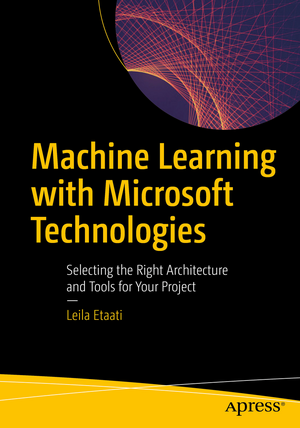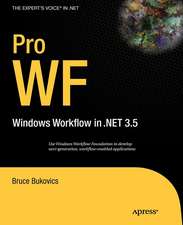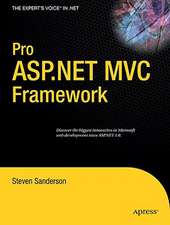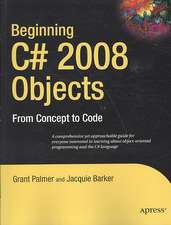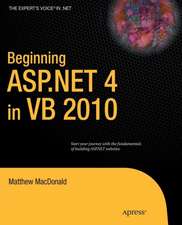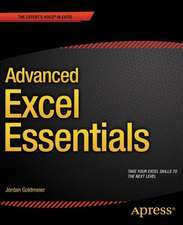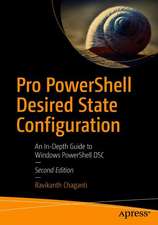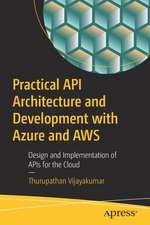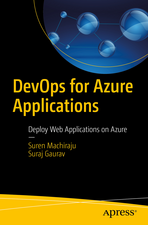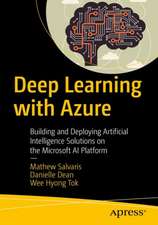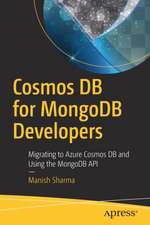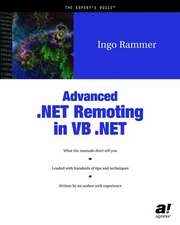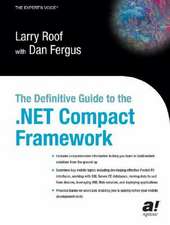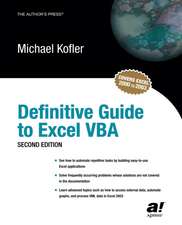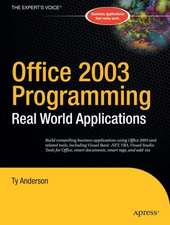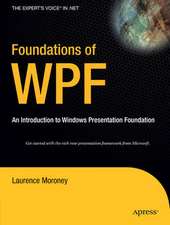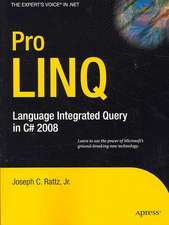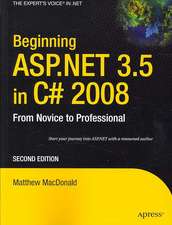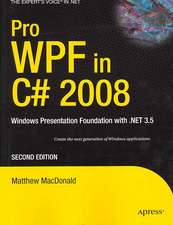Machine Learning with Microsoft Technologies: Selecting the Right Architecture and Tools for Your Project
Autor Leila Etaatien Limba Engleză Paperback – 13 iun 2019
The ability to analyze massive amounts of real-time data and predict future behavior of an organization is critical to its long-term success. Data science, and more specifically machine learning (ML), is today’s game changer and should be a key building block in every company’s strategy. Managing a machine learning process from business understanding, data acquisition and cleaning, modeling, and deployment in each tool is a valuable skill set.
Machine Learning with Microsoft Technologies is a demo-driven book that explains how to do machine learning with Microsoft technologies. You will gain valuable insight into designing the best architecture for development, sharing, and deploying a machine learning solution. This book simplifies the process of choosing the right architecture and tools for doing machine learning based on your specific infrastructure needs and requirements.
Detailed content is provided on the main algorithms for supervised and unsupervised machine learning and examples show ML practices using both R and Python languages, the main languages inside Microsoft technologies.
What You'll Learn
- Choose the right Microsoft product for your machine learning solution
- Create and manage Microsoft’s tool environments for development, testing, and production of a machine learning project
- Implement and deploy supervised and unsupervised learning in Microsoft products
- Set up Microsoft Power BI, Azure Data Lake, SQL Server, Stream Analytics, Azure Databricks, and HD Insight to perform machine learning
- Set up a data science virtual machine and test-drive installed tools, such as Azure ML Workbench, Azure ML Server Developer, Anaconda Python, Jupyter Notebook, Power BI Desktop, Cognitive Services, machine learning and data analytics tools, and more
- Architect a machine learning solution factoring in all aspects of self service, enterprise, deployment, and sharing
Data scientists, data analysts, developers, architects, and managers who want to leverage machine learning in their products, organization, and services, and make educated, cost-saving decisions about their ML architecture and tool set.
Preț: 136.78 lei
Preț vechi: 170.98 lei
-20% Nou
Puncte Express: 205
Preț estimativ în valută:
26.17€ • 27.40$ • 21.66£
26.17€ • 27.40$ • 21.66£
Carte disponibilă
Livrare economică 15-29 martie
Livrare express 01-07 martie pentru 38.92 lei
Preluare comenzi: 021 569.72.76
Specificații
ISBN-13: 9781484236574
ISBN-10: 1484236572
Pagini: 450
Ilustrații: XV, 365 p. 365 illus., 356 illus. in color.
Dimensiuni: 178 x 254 x 23 mm
Greutate: 0.66 kg
Ediția:1st ed.
Editura: Apress
Colecția Apress
Locul publicării:Berkeley, CA, United States
ISBN-10: 1484236572
Pagini: 450
Ilustrații: XV, 365 p. 365 illus., 356 illus. in color.
Dimensiuni: 178 x 254 x 23 mm
Greutate: 0.66 kg
Ediția:1st ed.
Editura: Apress
Colecția Apress
Locul publicării:Berkeley, CA, United States
Cuprins
Part I: Getting Started.- Chapter 1: Introduction to Machine Learning.- Chapter 2: Introduction to R.- Chapter 3: Introduction to Python.- Chapter 4: R Visualization in Power BI.- Part II: Machine Learning in R and Power BI.- Chapter 5: Business Understanding.- Chapter 6: Data Wrangling for Predictive Analysis.- Chapter 7: Predictive Analysis in Power Query with R.- Chapter 8: Descriptive Analysis in Power Query with R.- Part III: Machine Learning SQL Server.- Chapter 9: Using R with SQL Server 2016 and 2017.- Chapter 10: Azure Databricks.- Part IV: Machine Learning in Azure.- Chapter 11: R in Azure Data Lake.- Chapter 12: Azure Machine Learning Studio.- Chapter 13: Machine Learning in Azure Stream Analytics.- Chapter 14: Azure Machine Learning (ML) Workbench.- Chapter 15: Machine Learning on HDInsight.- Chapter 16: Data Science Virtual Machine and AI Framework.- Chapter 17: Deep Learning Tools with Cognitive Toolkit (CNTK).- Part V: Data Science Virtual Machine.- Chapter 18: Cognitive Service Toolkit.- Chapter 19: Bot Framework.- Chapter 20: Overview on Microsoft Machine Learning Tools.
Notă biografică
Leila Etaati, PhD, is a Microsoft artificial intelligence and data platform MVP, speaker, trainer, and founding consultant with RADACAD where she trains and strategically advises some of today’s largest global enterprises. Renowned in the field of AI and BI, she presents at many Microsoft events, including Ignite, Microsoft Data Insights Summit, PASS, and more. Leila is passionate about teaching others and resolving complex business solutions through the vast capabilities of machine learning and BI. She blogs and is author of Power BI and R through RADACAD.
Textul de pe ultima copertă
Know how to do machine learning with Microsoft technologies. This book teaches you to do predictive, descriptive, and prescriptive analyses with Microsoft Power BI, Azure Data Lake, SQL Server, Stream Analytics, Azure Databricks, HD Insight, and more.
The ability to analyze massive amounts of real-time data and predict future behavior of an organization is critical to its long-term success. Data science, and more specifically machine learning (ML), is today’s game changer and should be a key building block in every company’s strategy. Managing a machine learning process from business understanding, data acquisition and cleaning, modeling, and deployment in each tool is a valuable skill set.
Machine Learning with Microsoft Technologies is a demo-driven book that explains how to do machine learning with Microsoft technologies. You will gain valuable insight into designing the best architecture for development, sharing, and deploying a machine learning solution. This book simplifies the process of choosing the right architecture and tools for doing machine learning based on your specific infrastructure needs and requirements.
Detailed content is provided on the main algorithms for supervised and unsupervised machine learning and examples show ML practices using both R and Python languages, the main languages inside Microsoft technologies.
What You'll Learn:
The ability to analyze massive amounts of real-time data and predict future behavior of an organization is critical to its long-term success. Data science, and more specifically machine learning (ML), is today’s game changer and should be a key building block in every company’s strategy. Managing a machine learning process from business understanding, data acquisition and cleaning, modeling, and deployment in each tool is a valuable skill set.
Machine Learning with Microsoft Technologies is a demo-driven book that explains how to do machine learning with Microsoft technologies. You will gain valuable insight into designing the best architecture for development, sharing, and deploying a machine learning solution. This book simplifies the process of choosing the right architecture and tools for doing machine learning based on your specific infrastructure needs and requirements.
Detailed content is provided on the main algorithms for supervised and unsupervised machine learning and examples show ML practices using both R and Python languages, the main languages inside Microsoft technologies.
What You'll Learn:
- Choose the right Microsoft product for your machine learning solution
- Create and manage Microsoft’s tool environments for development, testing, and production of a machine learning project
- Implement and deploy supervised and unsupervised learning in Microsoft products
- Set up Microsoft Power BI, Azure Data Lake, SQL Server, Stream Analytics, Azure Databricks, and HD Insight to perform machine learning
- Set up a data science virtual machine and test-drive installed tools, such as Azure ML Workbench, Azure ML ServerDeveloper, Anaconda Python, Jupyter Notebook, Power BI Desktop, Cognitive Services, machine learning and data analytics tools, and more
- Architect a machine learning solution factoring in all aspects of self service, enterprise, deployment, and sharing
This book is for data scientists, data analysts, developers, architects, and managers who want to leverage machine learning in their products, organization, and services, and make educated, cost-saving decisions about their ML architecture and tool set.
Leila Etaati, PhD, is a Microsoft artificial intelligence and data platform MVP, speaker, trainer, and founding consultant with RADACAD where she trains and strategically advises some of today’s largest global enterprises. Renowned in the field of AI and BI, she presents at many Microsoft events, including Ignite, Microsoft Data Insights Summit, PASS, and more. Leila is passionate about teaching others and resolving complex business solutions through the vast capabilities of machine learning and BI. She blogs and is author of Power BI and R through RADACAD.
Caracteristici
Offers methods for choosing the right architecture for a machine learning solution using Microsoft technologies Gives you valuable knowledge for creating, developing, and deploying machine learning in different products Provides a holistic perspective of the options for doing machine learning using different Microsoft tools
